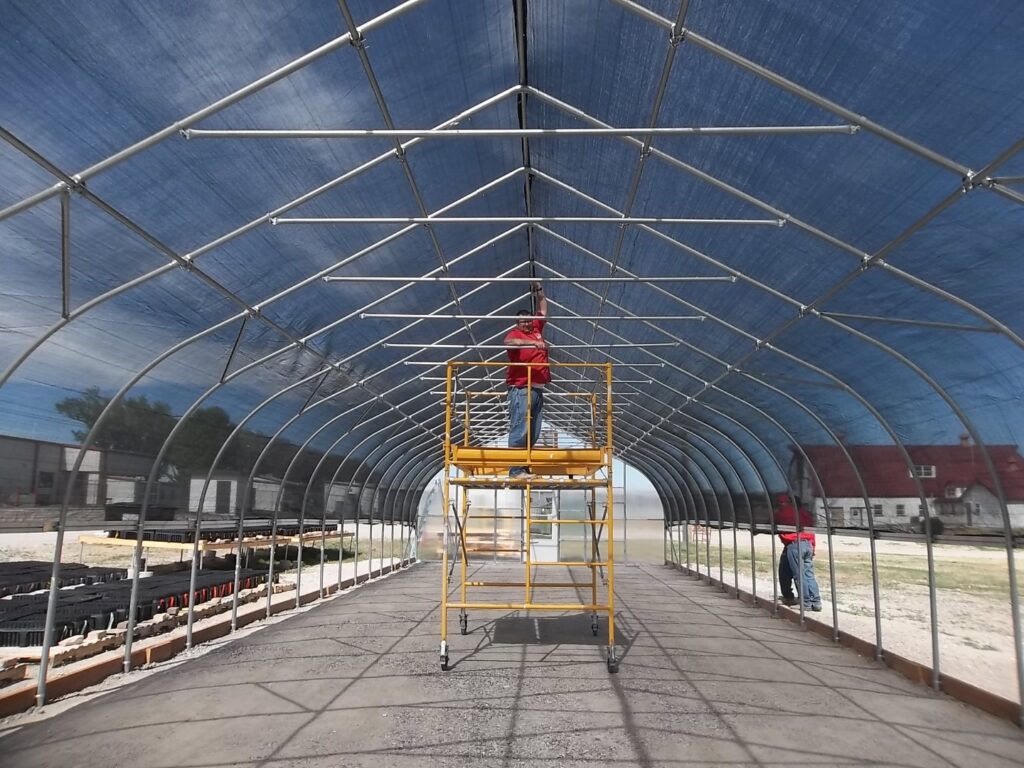
By Kristine Galloway
Inmates at the Wyoming Honor Farm, a minimum security corrections facility in Riverton, set up a greenhouse at the Honor Farm in June.
They are exclusively growing about 40,000 seedlings of various types of sagebrush for the Abandoned Mine Lands Native Plants Project through the Wyoming Department of Environmental Quality and the Bureau of Land Management.
That project is part of an inter-agency effort to restore the fractured sagebrush steppe ecosystem across the U.S. West.
Don Newton, an Abandoned Mine Lands project manager for the DEQ, said the effort was inspired by the Sagebrush in Prisons Project created by the Institute for Applied Ecology. He explained that the greenhouse at the Honor Farm is partially funded through a grant from the IAE and partially through DEQ with a grant from the BLM.
Gina Clingerman, the archeologist and project manager for the BLM’s Abandoned Mine Lands program in Wyoming, said they originally obtained seeds for this project from the BLM’s Seeds of Success program. Through that program, botanists collect more than 10,000 seeds in Wyoming for a seed bank and use the rest for research, reclamation and habitat restoration projects, she explained.
The IAE provided a curriculum for the project that guides the inmates through ecology and habitat restoration. Three inmates work in the greenhouse full time, and they learn skills they can take with them when they leave the Honor Farm.
Michael Catt, the inmate in charge of the greenhouse, said he and his coworkers, Drew Moore and Christopher Eagle Road, work in the greenhouse from 8 a.m. to 4 p.m. every day with an hour break for lunch. They return from 6-7 p.m. to water the seedlings.
Moore added that they check the pH of the seedlings every Friday.
Catt said the work has been humbling for him, and he added that he might be interested in teaching a similar program in prisons someday.
Moore said he might be able to use the skills to work in a garden center someday. Not only that, but he spoke of starting a garden as a way to reconnect with his daughters after his release.
Eagle Road said he likes that the program offers him economic opportunities and lets him benefit the environment, which is especially important to him as a Native American.
“And for peace of mind. We’re giving back instead of hurting and taking away,” he said.
Moore added, “Doing this, I did give something back to the state of Wyoming.”
Catt said representatives from the Department of Corrections are looking at the opportunity to allow the inmates to leave the Honor Farm for one day to plant some of the seedlings, which would let them really see their work through to the end.
Steve Lindly, deputy director of the Wyoming Department of Corrections said the project directly supports the agency’s mission, part of which is to help inmates become law-abiding citizens when they leave to re-enter society, including teaching them the tools and resources to help them be successful.
“This program may eventually lead to some type of certification, which could allow involved inmates to potentially do something related on the outside,” Lindly said.
Whether that certification or organized college credit will come to fruition remains to be seen, but it’s a hope of the Department of Corrections and the Honor Farm representatives.
Work-related projects like this contribute to lower recidivism rates among inmates following release, as well. Lindly explained that inmates who learn skills they can use to support themselves and maintain a job when they are released are naturally less likely to reoffend.
